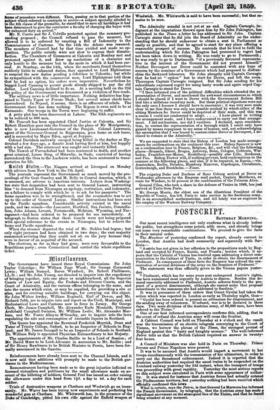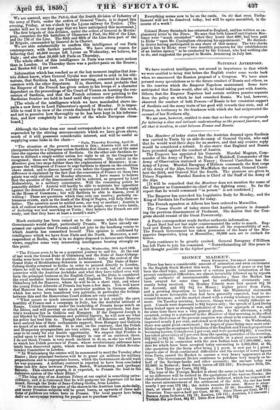POSTSCRIPT.
SATURDAY MORNING.
Our most recent intelligence not only confirms what is already before the public, but strengthens some points, adds more, and already brings out some very remarkable combinations. We proceed to give the facts in their natural order.
The Moniteur of yesterday confirmed the report, already current in' London, that Austria had dealt summarily and separately with Sar- dinia—
" A ustria has not given in her adhesion to the propositions made by Eng- land and accepted by France, Russia, and Prussia ; besides which, it ap- pears that the Cabinet of Vienna has resolved upon addressing a direct com- munication to the Cabinet of Turin, in order to obtain the disarmament of Piedmont. In consequence of these facts the Emperor has ordered the con- centration of several divisions of the army on the frontiers of Piedmont." The statement was thus officially given in the Vienna papers yester- day. Piedmont, which has for some years past endangered Austria's rights, has been summoned most urgently by Austria to disarm. Besides this de- mand especially addressed to Piedmont, Austria adheres firmly to the pro- posal of a general disarmament, although she cannot make that proposal subordinate to the summons she had addressed to Sardinia."
It was in pursuance of these orders that Count Gyulai had taken the action which was reported in London as early as Thursday night, thus- " Gyulai has been ordered to present an ultimatum for disarmament, and the sending away of volunteers. If refused, war is to be declared in three days. Two more divisions of the Austrian army, of 80,000 men, have been ordered to the Ticino."
One of our best informed correspondents confirms this, adding, that in the event of refusal the Austrian army will cross the frontier. A Cabinet Council was held on Thursday at 4 o'clock and the result was the transmission of an electric telegram conveying to the Court of Vienna, we borrow the phrase of the Times, the strongest protest of England against this " hasty and haughty menace." The well-informed Patrie tells us that the British Cabinet required an answer in twenty- four hours.
A Council of Ministers was also held in Paris on Thursday. Prince Jerome and Prince Napoleon were present.
It was to be assumed that Austria would impart a movement to her troops simultaneously with the transmission of her ultimatum, in order to carry out the threatened enforcement. Indeed it is reported that the Austrian authorities had required the usual trains to be suspended on the Lombard railway yesterday the 22d instant, when the transport of troops was proceeding with great rapidity. Yesterday the most serious reports on this subject were circulated in Paris with some appearance of author.' ity. It was stated for instance that Austrian forces had actually entered the Piedmontese territory, but yesterday nothing had been received which officiallyconfIrmed this news i
What is certain, says the Patrie, is that General La Marmara has informed the French Government, by telegraph, that the Austrian army has made a significant movement on the strategical line of the Ticino, and that he feared being attacked at any moment.
We are assured, says the Fatrie, that the fourth division of Infantry of the army of Paris, under the orders of General Vinois, is to depart this evening, Friday, at ten o'clock by the Lyons railway for Toulon. [The reader will see in our first page that we have anticipated this movement.] The first brigade of this division, under the orders of General de Merlin- prey, comprises the 6th battalion of Chasseurs Pied, the 82d of the Line, and the 73d of the Line. The 85th and 86th of the Line form part of the 2d Brigade, commanded by General de is Charier. We are able substantially to confirm this intelligence of our Paris contemporary, with further particulars. We have strong reason for believing that 40,000 troops left Lyons on Wednesday, we believe, for Italy ; and also that 20,000 left Paris on Thursday, The whole effect of this intelligence in Paris was even more serious than in London. On Thursday there was a perfect panic on the Bourse ; and Rentes fell 11 per cent.
Information which has reached us at the last moment implies that Aus- tria didnot know, when General Gyulai was directed to send in his ulti- matum, that Sardinia had, on Tuesday morning, consented to disarm in common with the other disputants. It is, therefore, most probable that the Emperor of the French has given orders to his troops of a character dependant on the proceedings of the Court of Vienna on learning the con- cession of Sardinia, and that the French columns now pointing to the Sardinian frontier are held in hand until they receive other directions.
[The whole of the intelligence which we have marshalled above im- parts a new force to Lord Palmerston's speech of Monday. It is impos- sible to read it in view of the events disclosed by the news of this week, and not to perceive how thoroughly up he has been kept in his informa- tion, and how completely he is master of the whole European chess- board.]



























 Previous page
Previous page